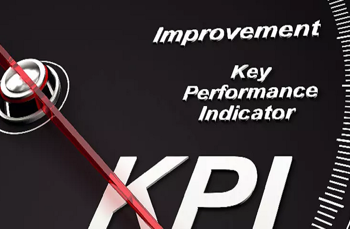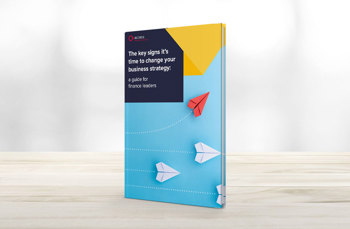How CFOs can use Business Intelligence
Business Intelligence is crucial for strategic decision-making and supporting business operations. As a Chief Financial Officer (CFO), how can you use it to drive business success? Let's find out!
In a world driven by data, the finance department has become strategically important to all organisations, from charities, health and social care, professional services, recruitment services, to financial services.
Business Intelligence (BI) is one of the most critical tools available to Chief Financial Officers (CFOs) and their teams for strategic decision-making and supporting business operations.
CFOs are using Business Intelligence to drive company strategy and answer questions about the success of marketing campaigns, the performance of new product lines, bottlenecks in a supply chain, and gain detailed customer insights.
In this article, we will explain what Business Intelligence is, why it is important for CFOs, how finance teams can use Business Intelligence, and how CFOs can use Business Intelligence to contribute to business strategy.
What is Business Intelligence (BI)?
Most companies can benefit from incorporating BI solutions; managers with inaccurate or incomplete information will tend, on average, to make worse decisions than if they had better information.
BI aims to simplify and structure the high volume of data produced within companies to provide meaningful reports and dashboards that enable comprehensive analysis and enhance decision-making.
There are many tools and software available that come in a wide variety of forms, such as spreadsheets, reporting and query software, data visualization software, data mining tools, and online analytical processing (OLAP) tools.
BI tools enable non-technical individuals to run reports and view dashboards to analyse corporate data, allowing them to access the information they need when they need it - in a readable and usable form.
Customisable dashboards enable the real-time analysis of business objectives and goals based on the data stored in a central database. The CFO, finance team and business decision-makers can then identify trends, opportunities and exceptions from the information and drill down into any underlying data for more detail.
Find out how our Finance software can provide your business with one single view of your business operations and access the information you need when you need it.

Why is Business Intelligence important for CFOs?
Business Intelligence is important for CFOs because it supports the core business goals of growing the business, operating more efficiently, and increasing competitive advantage.
BI is an essential tool for a CFO and their finance team, the rest of the C-suite and other business areas and can be used in many ways.
Find meaning in the sea of data
Business Intelligence enables CFOs to filter through the terabytes of data in their organisation to make it more meaningful and useful for them.
BI organises information and makes it easy to analyse, manipulate and transform into meaningful reports, charts and graphs and share with the whole organisation.
CFOs can then use this to support their message at all levels within the organisation, from the board and C-suite to operations, development teams and customer-facing staff.
Gain customer insights
With Business Intelligence, successful businesses can
- anticipate their customer’s needs, drivers and buying behaviours early
- help CFOs, and their business identify customer trends and better understand their target markets
- support data segmentation into geographic and demographic segments better understand purchasing decisions.
The vast amount of customer data that is tracked and collated today can provide a considerable volume of insider information that was previously unavailable. This includes cookie data from website behaviour and email marketing, sales and customer data held in customer relationship management (CRM) systems, loyalty card data, and third-party data. With BI, it is possible to track a customer online from researching products to buy, through to purchase, and after-sale usage.
BI provides an organisation and their CFO with a wealth of meaningful information that can lead to deeper insights and build better relationships with existing and potential customers.
Identify challenges and opportunities early
In challenging times such as a global recession or pandemic, organisations need the ability to understand the detail of trends, including an increase in online orders or a sharp decrease in orders due to a drop in customer spending. Maybe there’s an anomaly in the amount of revenue generated compared to that expected by a specific set of orders. Or maybe there is a government announcement that opens a gap in the market that your business could potentially exploit.
A real-time BI dashboard enables CFOs and the senior management team to view spikes, drops and gaps in information that can lead them to identify solutions to potential problems early, identify errors in pricing information, and identify opportunities that can be utilised quickly to address and halt potential revenue issues.
Empower your people with our real-time financial reporting software.
Efficiently allocate expenditure
A BI solution can combine data from multiple sources to provide an overall view of the digital transactions within a company.
Collating data from systems across the enterprise can give a view of the performance of marketing campaigns, for example, so that a CFO can see where expenditure on marketing was effective and could be better allocated if the campaign was unsuccessful.
Drawing data from enterprise resource planning (ERP), CRM, digital marketing platforms, social media, and web analytics can give an end-to-end insight into the performance of promotions and enable marketing insights at specific points in the transactions, as well across the entire set of resulting data.
Similarly, applying this holistic view of data to supply chains, human resources solutions, financial transactions, and other end-to-end solutions gives an insight into where expenditure can be allocated efficiently.
Optimise operations
When a CFO has a holistic view of their operations, issues can be quickly identified and resolved. For example, Business Intelligent tools can help identify where there may be bottlenecks within the finance team operations.
A CFO, finance team manager, or analyst with the right analytics can see and isolate the source of an issue and also identify potential solutions to address the issue and prevent it from happening again.
It may be a case of implementing a change to a finance process, removing a step in an overly complicated process, or reallocating resources to a different team. In any of these scenarios, an end-to-end BI solution will help identify where operations can be optimised, resolving or avoiding potential issues in the future.
Rapidly adjust to change
In today's business world, an organisation must be able to adjust to change to stay relevant and identify consumer trends and adapt to meet these trends rapidly.
BI can help CFOs identify where to focus spending on supporting these business changes but also monitor the effect of the change and determine its effectiveness.
The ability to get answers quickly from BI will enable a business to pivot rapidly and adjust to changes in the environment, markets, and consumer trends.
Visit our Finance software hub to see how we can help you optimise operations and rapidly adjust to change today and into the future.
How are finance teams using Business Intelligence?
Finance teams use Business Intelligence to gain business insights from historical and current data and perform financial analysis to develop trend data extending into the future to support strategic planning.
In addition, finance teams use business intelligence to track their Key Performance Indicators (KPIs).
On a daily operational basis, finance teams use business intelligence in many ways to help their companies make smarter, data-driven decisions. Some of these include:
- Identifying opportunities to increase profit
- Analysing customer behaviour
- Comparing competitor data
- Tracking operational performance
- Improving and optimising finance operations
- Streamlining and optimising finance business processes
- Identifying and predicting successful outcomes
- Identifying and capitalising on market trends far in advance
- Predicting issues or problems before they occur
- Using data to resolve problems if they do occur
- Supporting strategic decision-making using real data
- Strengthening competitive advantage through added insights
- Reducing risk exposure with improved data
BI empowers finance teams to track their financial KPIs closely, optimise their supply chains, make better decisions within the finance department, and help the company make better business decisions.
A scalable BI solution, with a range of integrations, allows the finance team and the whole business organisation to analyse large volumes of data from many sources and parts of the business, providing a holistic view of the company's performance from the top down. It will also enable role-based access to ensure that the finance team can access the correct data, dashboards, and KPIs at the right time.
If you would like suggestions for the top KPIs your finance team should be tracking, check out our blog - 11 KPIs your Finance team should be tracking.
How can a CFO contribute to business strategy?
As the cost-benefit analysis of Business Intelligence has become increasingly more attractive to CFOs, they are using it to help themselves and their business to adapt and become resilient in a volatile business environment.
A business strategy supported by BI can benefit from a real-time view of every aspect of the company and utilise the data for strategic insights from sales, marketing, inventory, purchasing, pricing and consumer trends to inform and shape the business strategy.
As a business adopts a BI strategy and becomes more data-driven, the CFO can take a central role in selecting and implementing a BI solution.
The CFO can also support a smooth transition to a BI strategy and solution to ensure that business data from various sources and parts of the business is captured and enables the implementation and monitoring of the business strategy.
In addition, a CFO can ensure that BI dashboards are configured so that anyone in the business, from the executive level to finance teams and individuals, can see how the business is performing. For example, sales executives can view their sales figures and targets, warehouse staff can monitor stock volumes, and employees can see customer satisfaction scores.
Contributing to business strategy using business intelligence is just one facet of becoming a successful CFO. In this article, How to Become a Successful CFO, we examine the common traits shared by successful CFOs and the key elements and skills that add to CFO effectiveness.
Use finance software to help your Business Intelligence
How to succeed as a Strategic CFO
Adopting a strategic approach may seem daunting, pick up some tips on what strategic should look like and how you can take your business to the next level.

New CFO checklist: 90-day plan
Learn more about your first 3 months as a new CFO and where to start with our 90-day checklist.

7 essential skills for a CFO
Have a read through the 7 essential skills for a CFO to make a positive and lasting impact in your organisation.

How to become a successful CFO
Take a look at the common traits shared by successful CFOs and the key elements and skills that will add to CFO effectiveness.
Tips to help you lead a finance team
The Strategic CFO needs to deliver strong financial performance, and for this needs a strong finance team to support and align on those goals.

Structuring your finance team: best practices to follow
Understand the considerations and best practices to make when structuring your finance team.

11 KPIs your finance team should monitor
What are KPIs, and why should your finance team track them? Explore the top 11 KPIs your finance team should track and why.

How To Build a Highly Effective Finance Team
Learn how to build a finance team that will support the business’s financial growth, strategy and performance.

How to become a Finance Director
Read the key skills required of a Finance Director and the steps you should take to get there.
How can technology support you as a Strategic CFO
For any organisation to be successful it’s important to be able to identify when it’s time to change your strategy and drive your business forward.

The key signs it's time to change your business strategy
Explore the 3 signs of a poor strategy and how a modern, data-fuelled approach can make a difference.

Key signs it's time to change your accounting system
This webinar discusses the impact of under investment in software, why companies decide to change accounting systems, and how to choose the right supplier

The data-driven future of finance and why CFO's need to embrace it
Take a look at the role and the importance of data to gain a better understanding of the financial health of the business.

Guide to CFO software
Look at the software tools which are of most use to the modern CFO, as well as the latest technology trends to look out for.

 AU & NZ
AU & NZ
 SG
SG
 MY
MY
 US
US
 IE
IE